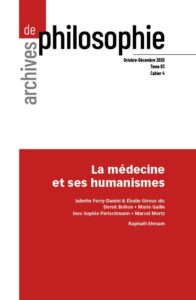 Volume 83, Issue 4, October-December 2020
Volume 83, Issue 4, October-December 2020
Medical humanism: What lies behind the label?
 Juliette Ferry-Danini & Élodie Giroux, Medical humanism: What lies behind the label? Foreword
Juliette Ferry-Danini & Élodie Giroux, Medical humanism: What lies behind the label? Foreword
Derek Bolton, The biopsychosocial model and the new medical humanism
Many aspects of Engel’s biopsychosocial model support humanistic approaches to medicine. Engel was explicitly negative, however, about approaches that would contrast medical humanism with medical science. Engel adopted a systems science approach to the study of human beings, health, and disease, and accordingly endorsed the use of a scientific approach for improving the quality of clinical care, in the sense of it being amenable to scientific study.
Marie Gaille, For a more human care. The resources of the ethics of care
By addressing the situations of care provided to the person who is sick and/or facing a loss of autonomy, this paper explores the resources offered by the ethics of care to respond to the following criticism: that of the lack of humanity addressed to medical or nursing institutions or to care providers at home. After examining the conditions under which such an ethics may fulfill this role, the article analyzes the meaning it gives to the care of others in terms of attention and then looks at the implications of the politicization of care.
Élodie Giroux, Is personalized medicine humanist?
Adopting a population-based perspective inspired by “population health sciences,” this article develops a criticism of the way that personalized medicine envisages the individual and the population and defends the idea that an approach that conjoins individual and population health is a basic condition of humanist medicine.
Ines Sophie Pietschmann & Marcel Mertz, Medical humanism and complementary, alternative, and integrative medicine
The advent of modern biomedicine is often viewed as a major advancement. Nevertheless, medical humanism questions whether current biomedicine and its healthcare system are still sufficiently oriented toward humanistic values such as dignity, autonomy, individuality, empathy, and humility. In addition to biomedicine, however, there are also many unconventional approaches to medicine that frequently claim to be more holistic or empathic than biomedicine. The aim of this paper is thus to explore whether so-called complementary, alternative, and integrative medicine (CAIM) may better correspond to the values attributed to medical humanism than biomedicine.
Juliette Ferry-Danini, Defining medical humanism beyond empathy
Empathy is often described as a virtue that could help in making medicine more humanistic. This paper argues that there are two limits to this thesis. First, it is unclear whether a lack of empathy can be attributed to biomedical education. Second, empathy itself is not without issues, and another concept, compassion, can be put forward instead. When integrated with an approach focused on healthcare systems, humanism based on the more minimalist concept of compassion becomes more tangible and radical.
* * *
Raphaël Ehrsam, On perspectivism, construed as a version of realism: Against antirealist readings of Nietzsche
In this paper, I argue that Nietzsche’s infamous theory of “perspectivism” is better construed as a version of realism than as a kind of antirealism foreshadowing the views of Quine, Rorty, or Derrida. I distinguish between three realist uses of the concept of “perspective,” in order to illuminate the way Nietzsche builds his strategic assessment of values, makes use of what we may call a “duplication trope,” and endorses an insightful view of the links between sense, interests, and states of affairs.
